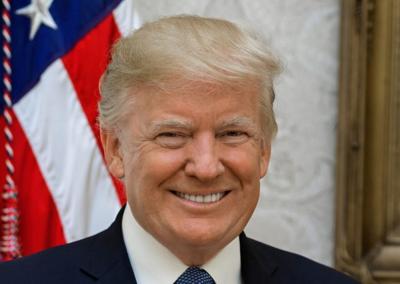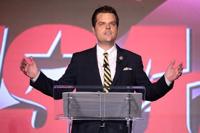
President Donald Trump
WASHINGTON – Touting a theory already rejected in court, President Donald Trump and his chief health officer – Robert F. Kennedy Jr. – introduced a plan Monday to link Tylenol use by pregnant women to autism in their children.
The two were joined at a press conference by Dr. Jay Bhattacharya, the head of the National Institutes of Health who has admitted to not being an expert in developmental pediatrics. The initiative drew jeers from those who feel current research does not indicate Tylenol causes autism.
And a press release from Trump included a quote from Dr. Andrea Baccarelli, a Harvard professor whose opinions were found too unreliable to put in front of a jury during a failed attempt by trial lawyers to sue companies who make acetaminophen-based products like Tylenol.
“We are unsure why this announcement came today and how the conclusions were drawn,” said Alison Singer, president of the Autism Science Foundation.
“No new data or scientific studies were presented or shared. No new studies have been published in the literature. No new presentations on this topic were made at scientific or medical conferences.”
Trump pointed to two studies, known as the Nurses’ Health Study II and the Boston Birth Cohort – information later analyzed by reports that experts for plaintiff lawyers relied on. New York federal judge Denise Cote tossed the opinions of all plaintiff experts last year, finding some of them had their conclusions driven by a desire to arrive at the result lawyers wanted.
The ruling was a blow to many high-profile plaintiffs firms. Leading the case were Ashley Keller of Keller Postman, Mikal Watts of Watts Guerra and Mark Lanier of The Lanier Law Firm. Defendants like Johnson & Johnson had argued the evidence put forward was “cherry-picked” and refused to address the role of genetics.
“They are correct,” Cote wrote.
“Despite the identified risk of genetic confounding, Dr. Baccarelli gives short shrift to the issue. The discussion in his reports is incomplete, unbalanced and at times misleading.
“In general, Dr. Baccarelli downplays those studies that undercut his causation thesis and emphasizes those that align with his thesis.”
It was just a month ago that Baccarelli, dean of the faculty at Harvard T.H. Chan School of Public Health, issued results from research of 46 previous studies on prenatal acetaminophen use, finding children may be more likely to develop neurodevelopmental disorders.
Baccarelli’s work was included in Trump’s press release. His study had been funded by the NIH, whose director Bhattacharya was a frequent topic after the COVID lockdown, testifying lockdowns and mask mandates did little to keep the disease from spreading.
When Tennessee allowed parents the option of having their kids wear masks, Bhattacharya was brought in for support. Instead, a federal judge his testimony “troubling and problematic” and that he was “not qualified to make several of his conclusions.”
From Bhattacharya’s testimony in the case:
Q. Would you agree with me that you are not an expert in developmental pediatrics?
A. Yes.
Q. Would you agree with me that you are not an expert in developmental psychology?
A. Yes.
Q. And would you agree with me that you’re not an expert in pediatrics generally?
A. Yes. I have published a variety of pediatric topics. And I read the literature on pediatric effects of COVID pretty carefully. Pediatric COVID-related topics, I’ve done a lot of reading.
Q. Have you done any independent research?
A. I mean, I think the studies that I published include some children.
Plaintiffs challenging Tennessee’s decision said Bhattacharya has never done a residency or obtained board certification in any medical field.
“Dr. Bhattacharya is not qualified to make several of his conclusions,” Tennessee federal judge Waverly Crenshaw, an Obama-appointee, wrote in 2021.
“He conceded that he does not practice medicine, is not board-certified in any medical field, and did not complete an infectious disease residency. Nevertheless, Dr. Bhattacharya purported to comment on a child’s risk of spreading infection or dying from COVID-19.”
RFK Jr.’s legal career included time in personal injury firms like Morgan & Morgan and Levin Papantonio, plus ties to one of the firms pushing cases alleging Roundup weedkiller causes cancer – Wisner Baum.
Morgan & Morgan recently had a federal judge throw out its lawsuit alleging ultra-processed foods were made to be as addictive as tobacco and marketed to young people, causing illnesses like diabetes. Mike Papantonio called UPF litigations “one of those mass torts that changes the word,” but a judge found the complaint lacking specifics.
RFK Jr. had called UPFs “poison” during his Senate confirmation hearings. In July, a month before the case was tossed, he announced a project to create a federally recognized definition for UPFs as part of his Make America Healthy Again agenda.
He’s also targeted another key product for the trial bar: talc. Thousands of lawsuits claim asbestos in cosmetic talc causes cancer, and earlier this year the FDA held a hearing on the possible dangers of talc in food.
RFK Jr. has long said the mercury preservative in vaccines causes autism – a debunked scientific theory trial lawyers promoted to keep their cases out of a special court for vaccine injuries that provided lower fees.








